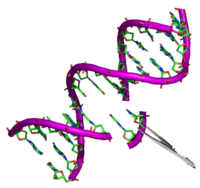
Photo from wikipedia
Simple Summary Vaccination represents one of the most relevant strategies to prevent and control infectious diseases in aquaculture. However, vaccines have failed to control and prevent Piscirickettsia salmonis, a bacterium… Click to show full abstract
Simple Summary Vaccination represents one of the most relevant strategies to prevent and control infectious diseases in aquaculture. However, vaccines have failed to control and prevent Piscirickettsia salmonis, a bacterium that causes large economic losses to the industry. Therefore, we evaluated the performance of two commercial vaccines in Atlantic salmon through a cohabitation challenge (healthy fish were challenged by cohabitation with infected fish) of the two most prevalent and ubiquitous Piscirickettsia genetic variants in Chile. We found no evidence that vaccines confer protection against the LF-89 or EM-90 genogroups in Atlantic salmon. Abstract In Atlantic salmon, vaccines have failed to control and prevent Piscirickettsiosis, for reasons that remain elusive. In this study, we report the efficacy of two commercial vaccines developed with the Piscirickettsia salmonis isolates AL100005 and AL 20542 against another two genogroups which are considered highly and ubiquitously prevalent in Chile: LF-89 and EM-90. Two cohabitation trials were performed to mimic field conditions and vaccine performance: (1) post-smolt fish were challenged with a single infection of LF-89, (2) adults were coinfected with EM-90, and a low level coinfection of sea lice. In the first trial, the vaccine delayed smolt mortalities by two days; however, unvaccinated and vaccinated fish did not show significant differences in survival (unvaccinated: 60.3%, vaccinated: 56.7%; p = 0.28). In the second trial, mortality started three days later for vaccinated fish than unvaccinated fish. However, unvaccinated and vaccinated fish did not show significant differences in survival (unvaccinated: 64.6%, vaccinated: 60.2%, p = 0.58). Thus, we found no evidence that the evaluated vaccines confer effective protection against the genogroups LF-89 and EM-90 of P. salmonis with estimated relative survival proportions (RPSs) of −9% and −12%, respectively. More studies are necessary to evaluate whether pathogen heterogeneity is a key determinant of the lack of vaccine efficacy against P. salmonis.
Journal Title: Biology
Year Published: 2022
Link to full text (if available)
Share on Social Media: Sign Up to like & get
recommendations!